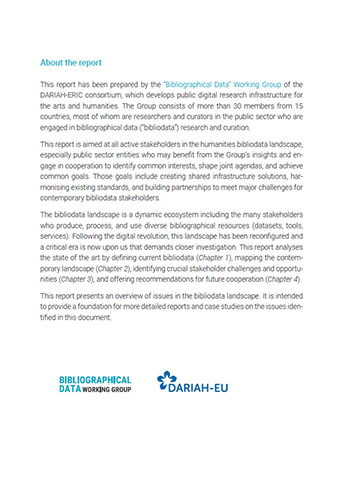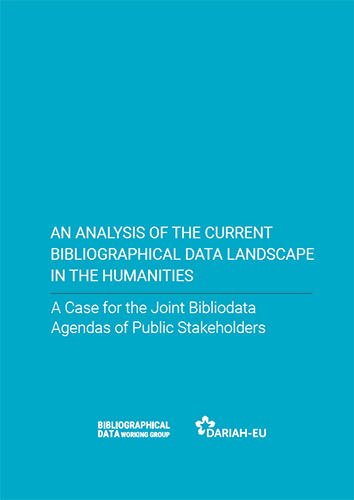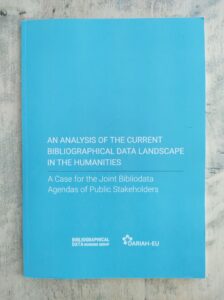

Tomasz Umerle; Giovanni Colavizza; Elżbieta Herden; Rindert Jagersma; Péter Király; Beata Koper; Leo Lahti; David Lindemann; Jakub Maciej Łubocki; Vojtěch Malínek; Alexandra Milanova; Róbert Péter; Nanette Rißler-Pipka; Matteo Romanello; Marcin Roszkowski; Dorota Siwecka; Mikko Tolonen; Ondřej Vimr
An Analysis of the Current Bibliographical Data Landscape in the Humanities. A Case for the Joint Bibliodata Agendas of Public Stakeholders
DARIAH-EU Bibliographical Data Working Group. Zenodo. Open Access, 2022
DOI: https://doi.org/10.5281/zenodo.6559857
Link: https://zenodo.org/record/6559857
Abstract:
This report has been prepared by the “Bibliographical Data” Working Group of the DARIAH-ERIC consortium, which develops public digital research infrastructure for the arts and humanities. The Group consists of more than 30 members from 15 countries, most of whom are researchers and curators in the public sector who are engaged in bibliographical data (“bibliodata”) research and curation.
This report is aimed at all active stakeholders in the humanities bibliodata landscape, especially public sector entities who may benefit from the Group’s insights and engage in cooperation to identify common interests, shape joint agendas, and achieve common goals. Those goals include creating shared infrastructure solutions, harmonising existing standards, and building partnerships to meet major challenges for contemporary bibliodata stakeholders.
The bibliodata landscape is a dynamic ecosystem including the many stakeholders who produce, process, and use diverse bibliographical resources (datasets, tools, services). Following the digital revolution, this landscape has been reconfigured and a critical era is now upon us that demands closer investigation. This report analyses the state of the art by defining current bibliodata (Chapter 1), mapping the contemporary landscape (Chapter 2), identifying crucial stakeholder challenges and opportunities (Chapter 3), and offering recommendations for future cooperation (Chapter 4).
This report presents an overview of issues in the bibliodata landscape. It is intended to provide a foundation for more detailed reports and case studies on the issues identified in this document.
This article is Open Access available.
Direct download: PDF (4,1 MB)

Update June 2023: a paperback edition is also available: ISBN 978-80-7658-067-1 (9788076580671).
.
This is a product of the DARIAH Bibliographical Data Working Group (Twitter).
See the DARIAH-EU website:
“The focus of the Bibliographical Data Working Group (BiblioData WG) is to foster cooperation between all the parties involved in the bibliographical data life cycle (especially data producers, managers/curators, researchers, and theorists of documentation and bibliography), which will contribute to the greater and more diverse research use of bibliographical data in the humanities.
Although bibliographical data is central to the humanities, and comprises of numerous services, tools, resources, interested researchers, there are no comprehensive initiatives aimed at addressing the issues of bibliographical data from the perspective of digital humanities and data-driven research. The BiblioData WG is a bottom-up attempt to bring together those different parties in order to build a larger framework for bibliographical data research, and address the main issues that the community is facing.”